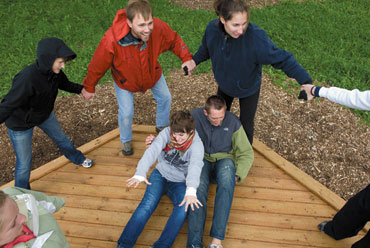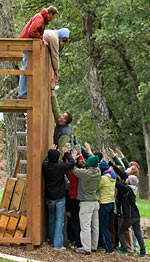Learning the ropes with Eric Knueve
Eric Knueve has been climbing trees and swinging from ropes for most of his professional life.

Eric Knueve (red jacket), an adviser for the Adventure Learning Programs and specialist in experiential education, joins student facilitators in working as a team to find the platform balancing point of a “four-way whale watch” during a training session at the group’s new, low-elements training course.
Photo: Jeff Miller
As adviser for Adventure Learning Programs (ALPs), a unit of the Student Organizations Office, he’s an expert in experiential education, a teaching philosophy involving learning by doing.
One key facet of ALPs is the use of climbing and ropes courses to help groups to build self-esteem, trust, teamwork, communication and problem-solving skills.
Slide show
“My passion really is working in the outdoors and the kind of group learning that can happen during those experiences,” says Knueve.
A ropes or challenge course is a series of activities and obstacles that provides small groups an intense adventure experience in accessible urban areas. In a low ropes course, obstacles are on or near the ground; while a high ropes course is built on utility poles, on trees or in the rafters of buildings.
Knueve still remembers the first time he did a ropes course at a YMCA summer camp.
“It was a very tedious process that you would slowly build up to. As a seventh-grader that was very frustrating, because all I wanted to do was climb,” he says. “When I finally got up there, I was absolutely terrified but thrilled at the same time.”
Knueve worked in experiential education at St. Norbert’s College in De Pere, Wis., and Indiana University in Bloomington, Ind., while completing a bachelor’s degree in sociology and a master’s degree in public administration with a focus on nonprofit management. After spending some time in Seattle working at nonprofits and restaurants, Knueve came to UW–Madison in November 2005.
“Eric couldn’t be a more perfect fit for the role of ALPs adviser,” says Ben Sprague, an ALPs student facilitator. “He brings the organization and continuity that allows us students to be productive with our energy.”
Knueve and the students at ALPs are making a two-decade-old dream a reality. The idea of a ropes course owned and operated by UW–Madison has been supported campuswide since the 1990s.
Located at the West Madison Agricultural Research Station, the low-ropes portion of the challenge course is now complete, and ALPs is working to find funding to add a high ropes element and a shelter structure.
Though Knueve isn’t out on the course as often as the students, he finds time to hone his skills with the Wisconsin Challenge Course Consortium (WC3), a group of ropes course providers in Madison who gather at area courses for training.
“It’s important to remember what a participant feels like that first time,” says Knueve. “Although after you’ve done it for so many years, it’s just what you do.”
Regardless, Knueve is still challenged by the “pamper” pole, where he climbs up a tall pole, stands at the top and jumps off to grab an object such as a bell or a trapeze. “Even though I know the strengths of the ropes and all of the equipment that’s holding me could hold a small bus, it still seems counterintuitive to be jumping out into thin air. My stomach still drops every time.”
Knueve emphasizes that ALPs doesn’t make assumptions about a person’s level of challenge.
“When you reach the point where you’re getting uncomfortable, to challenge yourself is to take one more step,” he says, adding that ropes course experiences are easily applied to real-world situations. Participants can remember that extra step they took on the ropes course and know they are still around to talk about it, says Knueve.
Last year, more than 3,000 people participated in ALPs workshops. As ALPs campus programming and resources continue to grow, Knueve hopes to also increase its community involvement.
“More and more outside groups are coming to us because they’ve heard of us through people at the university.” He says that with the new ropes course and additional staff, he hopes ALPs can sustain itself with outside group workshops, helping them further their mission and goals while carrying out the Wisconsin Idea.
“Eric is taking ALPs in directions it has always wanted, like building our own ropes course and giving us connections to other experiential learning professionals,” says Sprague. “I have no doubt Eric will be making significant marks on the UW campus in the near future.”
For more information, visit the ALPs program.
Tags: student life

